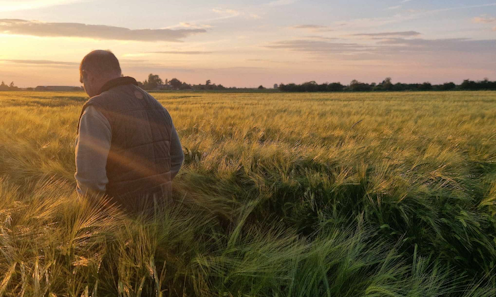
The Pearces have been farming the Fens of eastern England for generations – a region where more than a third of the country’s vegetables are grown, packed and processed. Andy and Rebecca Pearce lease a small family farm in south Lincolnshire with Andy’s parents and brother, on which they grow potatoes, wheat, pulses and sugar beet. They grew peas too until this year, when the unpredictable weather no longer made them viable.
Visiting their farm on a fine summer day, the landscape feels idyllic – big skies and black soil, epic fields and waterways. As he drives around in his tractor, Andy keeps a diary of all the wildlife he sees: starlings, sparrows, badgers and buzzards, kestrels, wagtails, hares and deer. It’s a job he and Rebecca talk about with passion and love – but their sense of vocation is clouded with ever-increasing money worries:
Look at the price of grain now: £180 a tonne – it was probably that in the mid-1990s … I can’t think of any other industry that is working on the same price as they were 30 years ago for produce. Yet the inputs have gone up astronomically.
In 2021-22 (the latest government statistics), the average farm household income in England was just £22,200. A 2025 report by the Food, Farming and Countryside Commission found that UK farmers’ incomes have remained stagnant over the past half-century, while costs have recently escalated, as Pearce explains:
In our case, rent is obviously one of the biggest outlays. Chemicals, fertilisers, tractors – you name it, everything has gone up astronomically … The ridiculous costs of machinery, the things you’ve got to do, the amount of red tape you’ve got to fill in, are all going one way.
He warns that farming is becoming an “impossible dream” for people like them – and that this is reflected in the reluctance of young people to get involved. He says it’s “almost impossible for somebody to come in now and start farming without some sort of backing”, explaining:
The sustainability of farming is getting less and less all the time … Unless you’ve got a big enough area to offset all that [expense], then it’s getting very, very difficult now. And that’s not going to change … You’re going to lose your family farms. You’re basically going to be left with agribusinesses at the end of the day.
Over the past three years, we have spent a lot of time in the Fens getting to know farmers like the Pearces. Our intention was to go beyond the polarised headlines to understand how farmers really feel, and what they want from government policy. For one of us (Dan), this forms part of Fen Power, a research project exploring how local infrastructure, identity and connection shapes economic sustainability and political trust in this part of rural England.
Despite farmers being highly skilled and hardworking experts who help maintain the UK’s food security and protect its countryside, many told us they feel abandoned by the government and anxious about their future. But delving deeper into the roots of this unhappiness, we found a more nuanced and complex story than is sometimes presented in media reports about the farmers’ protests.
A privilege or a curse?
Peter Lundgren farms the black soils of the Fens further north in Lincolnshire. Now in his sixties, he says farming is a “huge privilege – being able to walk across that field and ask nobody’s permission to do it”.
Lundgren – a non-organic farmer who campaigns against harmful pesticide and GM use – influenced a past Conservative government’s policy shift to link farming more closely with the provision of public goods. This included new subsidies to encourage farmers to protect biodiversity by planting more hedgerows and woodland, rather than focusing entirely on industrial food production.
Lundgren admits he leads a “very, very privileged lifestyle” – and as we walk around his beautiful small estate among dykes and woodland he has painstakingly restored, it’s hard to disagree. Yet now, he is selling up.
The Insights section is committed to high-quality longform journalism. Our editors work with academics from many different backgrounds who are tackling a wide range of societal and scientific challenges.
Unlike the Pearces, he has something to sell: Lundgren bought his 93-acre farm 30 years ago when it was rundown and collapsing. Having grown up on a struggling farm which eventually succumbed to debt, he has always sought a mode of farming that’s economically and environmentally sustainable. But now, while fit enough to continue, Lundgren says his passion is no longer there:
This spring, it shook me. I took rusty scrap into the scrap dealers in Lincoln, and I got more money a tonne for scrap metal than I got for my feed wheat … So the bread of life is worth less than rusty metal.
Many small- and medium-sized farmers find themselves under these growing economic pressures. Beyond the immediate crises of increasingly unpredictable weather or government policy, Lundgren says it comes down to the lack of power farmers have in the wider food system, where supermarkets and big suppliers drive down prices. The UK chicken industry, for example, is dominated by a handful of huge companies, so farmers can be forced into a loop of having to invest in big, expensive sheds in order to supply these few companies, as no one else buys chicken at this scale. As Lundgren puts it:
They’ll get a farmer to invest half a million quid in a chicken shed – and then they’ve got that farm exactly where they want them … They know they’ve got you under the thumb, and you now are a slave to [these companies].
Most farmers have a powerful sense of vocation in stewarding their land for future generations. But Lundgren says economic insecurity is putting off many farmers’ children from taking over the business. “One friend farms over in Norfolk … Both his sons have turned around and said: ‘You are bloody joking, dad.’”
Lundgren talks poignantly about the “feeling that you’ve let down past generations … that feeling of failure”. The economic decline he describes (in pints of beer) spans decades, not just recent years:
The first crop of wheat I grew, I got £120 a tonne for it – when I was 18 and beer was 50p a pint. So I got 240 pints for every tonne going off the farm. Last year, I got £65 a tonne and beer has come up to £3. So now, I’m getting 20 pints a tonne.
The problem, as Lundgren sees it, goes much deeper than the government’s recent policies that have sparked such ire in many farmers – most notably, the announcement that farmers would no longer be exempt from paying inheritance tax. From 2026, upon their death, any farm or business assets worth over £1 million could face a 20% inheritance tax over that threshold (with some exceptions). But for Lundgren, these tax changes are just another layer of risk in an already precarious profession. They exacerbate the fundamental problem of being “asset rich, cash poor” that affects so many in agriculture:
One of the worst problems is sometimes you put your hand in your back pocket and haven’t got the price of a pint – even though on paper, you’re worth a shitload of money.
This goes to the heart of occasional social media backlashes to the farmers’ protests. Rebecca Pearce describes the popular stereotype of farmers as rich aristocrats in tweeds, shooting foxes and “raping the countryside” with pesticides and shoddy practices.
There is a grain of truth in this image: around 30% of English land is owned by the aristocracy and landed gentry, and a significant further share is held by wealthy individuals including offshore firms and investment bankers (another 17% of land remains unregistered with the Land Registry, making ownership unclear). In recent decades, wealthy individuals have bought farmland to offset their tax liabilities – a key reason given by Labour for introducing the new inheritance tax rules.
But in practice, many ordinary family farms are being swept up in this new tax regime. According to estimates from the National Farmers Union and the Agriculture and Horticulture Development Board, around 75% of commercial farms – some 42,000 across England and Scotland – will be affected.
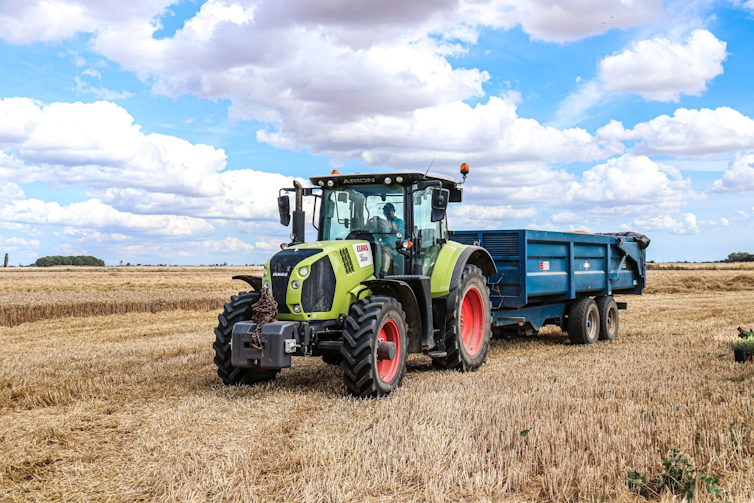
Given that farms are often in some of the most beautiful and sought-after locations for second homes and property developments in the UK, the capital assets (such as land and buildings) of these farms are often highly valuable, even if the farms themselves produce incomes for their owners which are little over the minimum wage.
And while around 60% of British farmers are tenants like the Pearces, who do not own the land they work, many still operate within family-run farm businesses that include owned assets such as machinery, livestock, stored produce or residential buildings. In some cases, these assets alone may push their estates above the £1 million threshold for full relief, or above the £3 million mark where inheritance tax liabilities begin to rise significantly.
TV programmes such as (Jeremy) Clarkson’s Farm have put the everyday struggles of farmers more squarely on the map, and around 55% of the public say they would support farmers if they were to go on strike, in line with support for nurses and paramedics. In April 2025, the UK’s first farmers’ strike broke out, with some farmers refusing to load milling wheat needed for Britain’s bakeries.
While a one-off event, it may not be the last. A recent Ashbridge survey of 2,000 British farmers suggested that 39% of their farms would be “unsustainable” within five years. There are now two options for most farmers to stay afloat: intensify food production, or sell up.
Lundgren has put his farm up for sale.
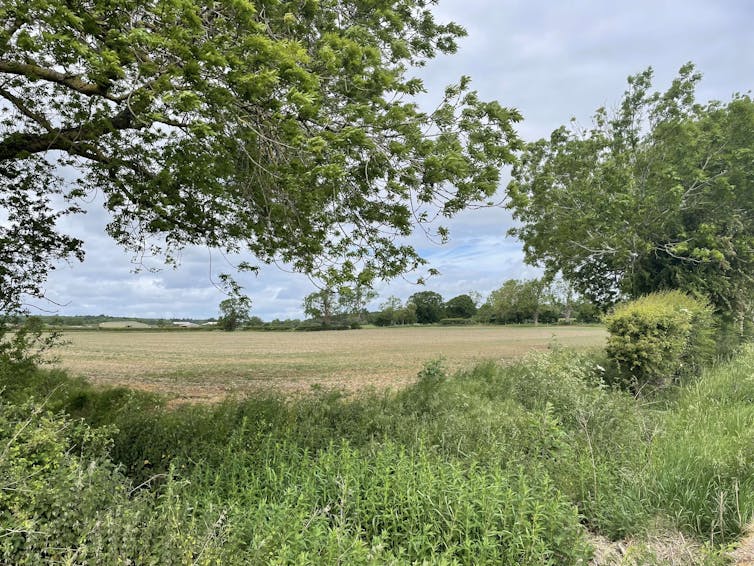
Why farming is such a gamble
Farming isn’t just a business, it’s a gamble. Take a tonne of wheat: the seed bought one month ago and put in the ground today will be harvested in up to a year’s time – meaning the farmer only gets paid for it in 18 months.
Now factor in the volatility of prices set by the global market amid the unpredictability of Brexit, COVID and Ukraine – not to mention the weather. In the Fens and many other parts of the UK, 2024’s unusually wet weather flooded and submerged many farmers’ crops.
Then there’s the volatility of government policies, from the long-term EU subsidies of the Common Agricultural Policy that made farming viable in an era of cheap food, to the hotchpotch of environmental policies post-Brexit, which today many farmers find incoherent and poorly implemented. According to Andy Pearce: “It’s a case of giving with one hand, and taking away at least as much with the other.”
There are many risks farmers have little protection from – including the hardball practices of supermarkets engaging in price wars. Farmers in the UK mostly supply supermarkets via suppliers, who have the power to reject and even fine farmers for not supplying to the right standard or quantity. Prices have been squeezed artificially low for decades by suppliers and supermarkets, even while new technologies and government directives have rapidly increased yields.
The only reason most farmers have remained in business is through vast subsidies like the EU’s Common Agricultural Policy, which encouraged high-input (high-fertiliser) farming and rewarded big landowners. But subsidies are double-edged: some farmers think the system allowed supermarkets to get away with paying low prices, because subsidies meant farmers would never face the threat of going out of business.
After the UK left the EU, the Conservative government introduced a new approach to farming: “Public money for public goods.” Farmers were now to be incentivised to prioritise sustainability and environmentalism over industrial food production, in the shape of Environmental Land Management schemes and the Sustainable Farming Incentive (SFI).
When introduced in 2021, these policies were generally widely embraced by farmers – all of whom, in our research, fully subscribed to an ethos of sustainability and public service.
But from the outset, conditions for accessing these funds were difficult. They required significant investment of time and money upfront, with payments later. They set conditions which are difficult, arbitrary and onerous. Subsequent rollout and payment delivery was slow. They only provided a financial reward to those who deliver environmental benefits in line with the goals of a 25-year environment plan that works towards achieving net zero by 2050. According to Andy Pearce:
There is absolutely nothing in it for us at all, basically … It is just not economically viable.
In December 2023, the Basic Payment Scheme – a longstanding government subsidy that provided a basic income safety net for active farms – came to an end. It was replaced from January 2024 by delinked payments: time-limited support based on past claims, with lower overall funding and fewer farms eligible.
This was followed in November 2024 by the suspension of several capital grants schemes to new applicants due to high demand. Then, at short notice, in March 2025, the SFI scheme was suddenly suspended to new entrants after reaching its annual budget cap.
Over the past decade, across both Conservative and Labour governments, British farmers have been gradually stripped of most sources of financial support. A turbulent and rapidly changing policy landscape has left few farmers able to adequately financially plan. Meanwhile, the cost of inputs rise, prices remain low, inheritance tax looms, and the work remains grindingly hard. Trust between government and farmers has never been lower. Andy Pearce says:
In the best-case scenario, I’m going to come out evens. If I have a really good harvest, I’m going to be losing money doing this scheme … Basically, we’ve got the worst of both worlds. Now we’re competing against subsidised produce from Europe without the subsidies.
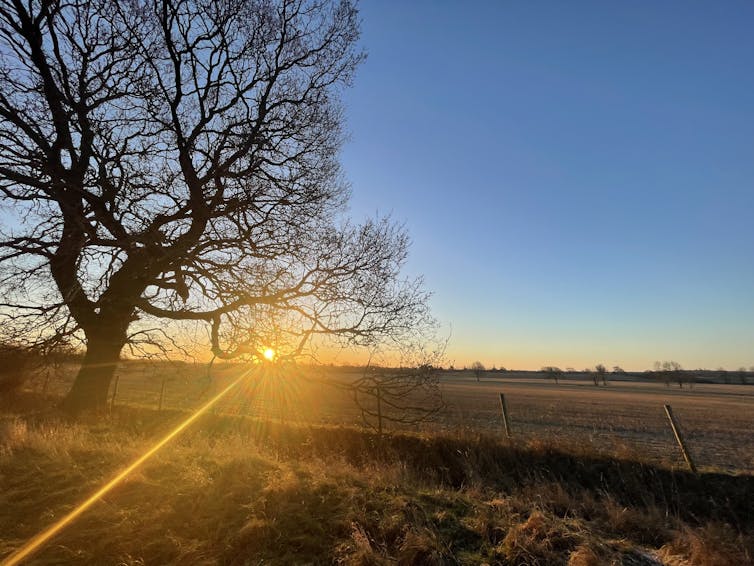
‘There’s got to be a total rethink’
Not everyone involved in farming is a freeholder or tenant. Some, like Martin Reams, work as farm managers for large agribusinesses that produce intensively at scale. They often work long hours on the land with the same passion and vocation as family farmers like the Pearces and Lundgren.
Reams oversees operations on a 2,000-acre farm in Lincolnshire with just two employees. They grow wheat, barley, peas, potatoes, broccoli and cauliflower. Come harvest time, they’ll draw on labour from eastern Europe – many migrant workers have also settled (mostly in the mid-to-late 2000s) and integrated into the local area.
Reams has farmed all his life; from his family’s smallholding to managing farms across the world. No two days are the same and he’s outdoors every day, come rain or shine. Also in his sixties, Reams has lived through a major technological revolution in farming.
Whereas once farms were labour-intensive and managed by hand, tractor and a crude understanding of fertilisers, farms like his are now managed using GPS field scans, smartphones, robotics, fine-tuned computer systems and self-driving tractors. “Today, one man’s probably doing the work of eight or nine [from] years ago,” Reams says, explaining that on his farm, “there’s two men and myself on 2,000 acres and we’re growing veg” (traditionally a very labour-intensive form of farming).
Out in the fields, year after year, Reams says he has witnessed the impacts of climate change at first-hand:
Without a shadow of a doubt, the weather has changed dramatically over the 45 years I’ve actively been working on farms … The big thing I have noticed is the amount of rain we get. It’s either all or nothing. Either very dry or very wet. And that is one of the major driving forces that is really [forcing us to upscale] what we’re doing.
Reams doesn’t own a farm, but like everyone else we spoke with, he’s dismayed by the change in inheritance tax rules, suggesting it will “probably kibosh a lot of the smaller farms”.
Many farmers we spoke to fear that, as more small- and medium-size farmers are driven to sell up to larger agribusinesses and solar farms, the standards of food production will fall, as the UK becomes reliant on cheap overseas producers not bound by the same environmental regulations.
Reams says simply: “We’re not on a level playing field.” When asked about farming’s future, his assessment is blunt:
At the present moment, I would say forget it – it’s doomed. It’s going to be like the coal mines, it’s going to be like the fisheries. There’s got to be a total rethink on food production, how people value food.
These days, the average age of British farmers is 59. It’s similar internationally, and a third of British farmers are over 65 and ought to be enjoying retirement. Most of the farmers we spoke to talked about the barriers for new entrants into farming: high amounts of capital to get started, difficult and long work, with median farm household incomes often below the minimum wage.
Having grown up on struggling farms, many farmers’ children – including Lundgren’s – have no interest in taking up the profession, and farmers appear less inclined to encourage them to follow in their footsteps. Whereas most of the people we interviewed worked on farms as children, today such practices are largely outlawed or frowned upon.
In response, some agricultural colleges are doing their best to attract young people to farming, and in recent years there has been a slight increase in the number of students enrolling to study land-based and agricultural degrees around the UK. We met one example of this potential new generation of farmers amid an array of beautiful flowers in the north-east of England.
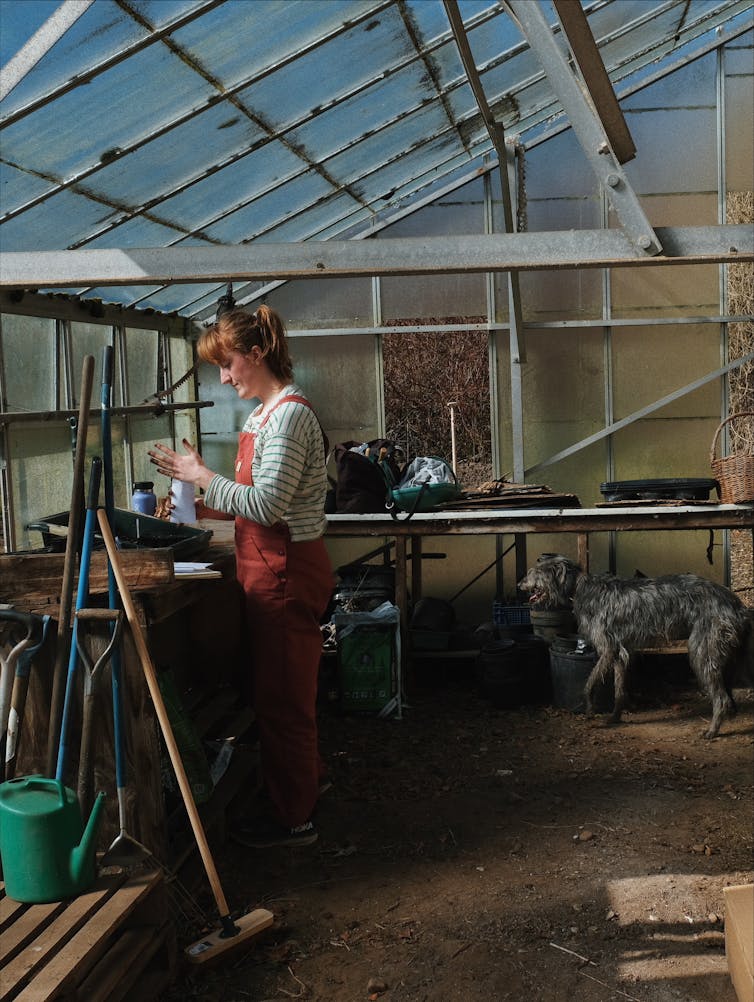
Regeneration is possible
“Why have I not been doing this my entire life?” Roisin Taylor asks us, having recently established a two-acre flower farming business on a new site near Newcastle (her mother having originally founded the company). She’s not being sarcastic.
Taylor grew up in County Durham, working on farms and dry-stone walling. Like many her age, she took the university route, completing two degrees before coming back into farming and agricultural community engagement. A co-director of UK Youth 4 Nature and Nuffield farming scholar, she researches how the British cut-flower industry should adapt to a world of two-degree warming.
Having not come from a farming family directly, and despite facing the new entrant barriers – notably the difficulties of securing land – Taylor’s story suggests farming can still be a career and lifestyle that attracts young people.
She is passionate about the future of horticulture – in particular, its need to adapt to climate change. She calls for a long-term perspective where “public money for public good” is used to make farming a high-skill, high-conservation catalyst for change. At the same time, she highlights the failures of the current renting model, particularly for small-scale farming:
It’s frightening that somebody might have control over a large portion of my business. It makes it more difficult to invest in the long-term purchases you need to make your businesses sustainable.
While Taylor does not work in food production, flower farming has also been affected by the policy “chaos” that other interviewees have highlighted to us. In 2023 at the time of speaking to Taylor, the previous government’s plan for a new horticulture strategy was abruptly scrapped. Speaking more widely about how farmers were feeling, Taylor told us:
If you don’t feel like you’ve got a voice, of course you’re going to go out and complain because you don’t feel you’ve got agency … The cycle of distrust continues to grow. Motivation is driven by momentum, and we need some wins to prove to farmers, growers and policymakers that change is possible.
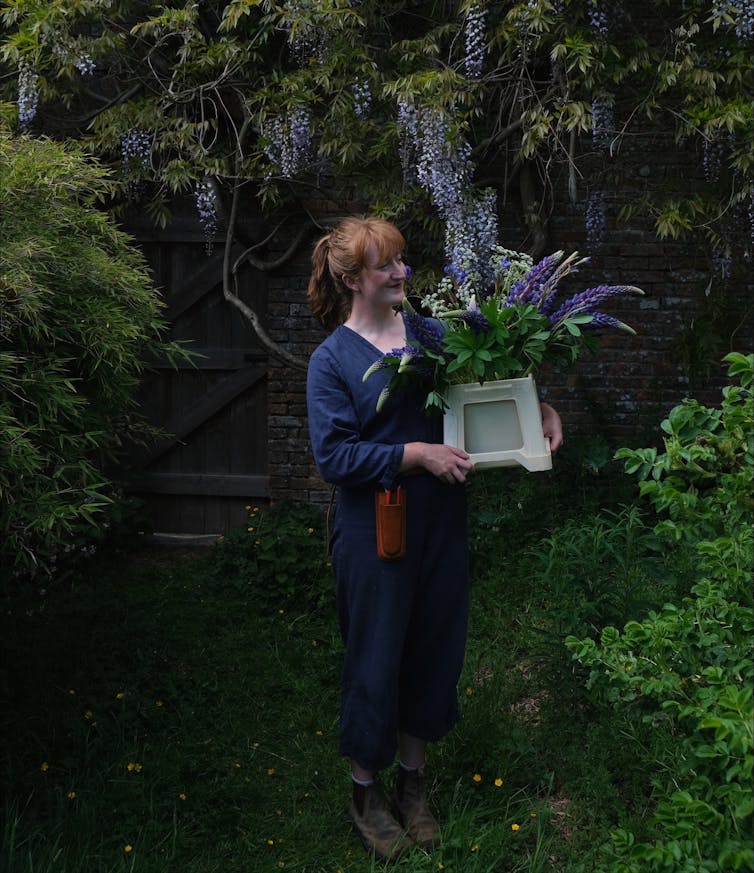
Earlier in 2025, the National Farmers’ Union published a UK horticulture strategy for growth in which it welcomes the government’s promised “roadmap” for farming in England up to 2050 as “an ambitious vision to make farming and growing more sustainable and profitable”. In her roles both as farmer and advocate, Taylor aims to act as a bridge between farmers, policymakers and environmentalists, and is confident they can find common ground:
Both farmers and environmentalists are trying to move the dial forwards. They’re just trying to both make a living and also see a future where something is better … [But] public perception of farming is steeped in inaccuracies, which does the sector no favours when we are trying to advocate for change.
Nonetheless, Taylor is in it for the long haul. Part of the gamble and privilege of farming, she says, is working to a much longer timeframe – with the need to also consider “building things like climate adaptation into that long-term framework and planning”. But is time running out?
The future of farming
We’re back with Andy and Rebecca Pearce in their cottage. Andy’s mum brings in mugs of tea, followed by his brother popping in to check they’ve got enough oil for the tractor. “It used to be a man with a spanner who’d come out and fix it, now it’s a man with a laptop,” Rebecca quips.
Though the Pearces are tenant farmers, they are mired in the same challenges and uncertainty as many other small and medium-sized farmers we spoke with. Andy tells us that from a smaller farmer’s point of view, “the sustainability of farming is getting less and less all the time”.
As costs for farmers grow and revenues shrink, he says that “unless you’ve got a big enough area to offset that, then it’s getting very, very difficult now. That’s not going to change.” His prognosis is clear:
You’re going to lose your family farms. You’re basically going to be left with agribusinesses at the end of the day.
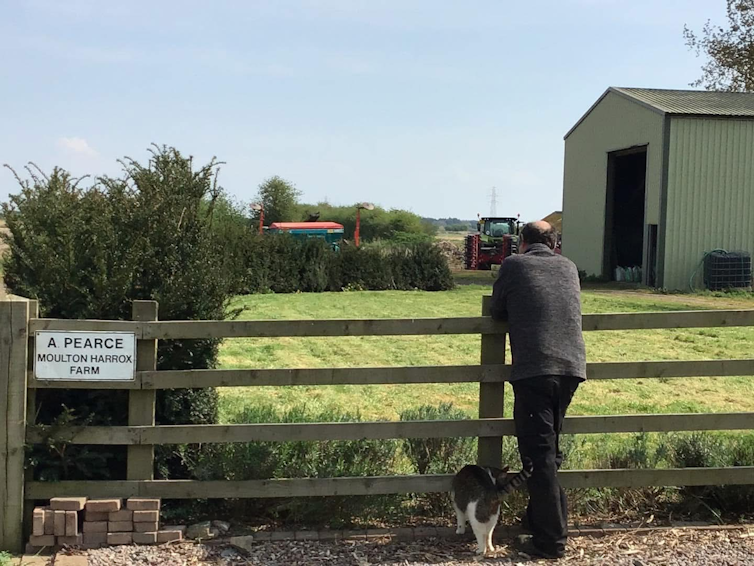
We heard this message time and again from the farmers, farm managers, agronomists (who study the science of soil management and crop production) and rural communities we spoke with.
And yet the demise of family farms is not some natural inevitability, like the melting of glaciers or the mizzley rain in these parts.
Farmers are sometimes criticised for over-extracting from the natural environment to put food on our tables. But they are just one piece of the jigsaw. It isn’t just the soil that’s depleted through overextraction; the people who produce our food and protect our countryside are also being depleted. At its root, Taylor says, is the fact that “we don’t pay what food’s worth”.
Farmers aren’t the only group in society battling the effects of inflation. But they are perhaps uniquely exposed. Unlike many businesses that can simply shift their costs on to customers while maintaining profit, farmers are at the frontline of a complex modern food system in which the price we pay for our food, most often in supermarkets, has been kept low for decades by extensive price squeezing.
But it’s not just farmers who suffer as a result. Lundgren talks about a fundamental “divorce” between farmers and consumers in modern society:
I think my argument about farmers being divorced from consumers, it’s very much around the creation of the food chain. The further we get forced apart is another link in that damn chain so that someone else can get in and make a lot of money.
Reams offers a memorable example of this breakdown in the connection between consumers and their food:
I went to a school not very far from here in rural Lincolnshire, took a sugar beet, and nobody knew what it was. In rural Lincolnshire! They didn’t know what it was.
This disconnect breeds misconceptions and bewilderment on both sides – as Rebecca Pearce expresses over tea in their farmhouse cottage: “I don’t really understand why people hate farmers so much, when everybody eats.”
In our plastic-packed, supermarket-fed world, a lot of the public doesn’t understand where food comes from – nor have the time to find out. On the other side, many of the farmers we spoke to think that all the public wants is cheap identical food, with little regard for who makes it and with what means.
Neither is true, as Lundgren explains in characteristically colourful style:
Farmers will come in the pub on a Friday night and say: ‘The public don’t care as long as it’s cheap.’ Which is absolute crap. And the public will say: ‘You never see a farmer on his bike – [instead] driving around in Range Rovers shouting “get off my land!"‘ Which is also crap.
What’s undeniable is that the British food system is under immense strain. Consumers are failing to get access to affordable, nutritious food, and many farmers are struggling to maintain a basic livelihood or pass on their farms to their children. "We’ve got to work together with environmental groups and everybody to try and get farming [better understood],” Rebecca Pearce says. “There has to be a dialogue.”
For you: more from our Insights series:
Toxic chemical pollution continues on Isle of Man as government defends Unesco conservation status
Britain’s ‘broken’ water system: a history of death, denial and diarrhoea
Dan Taylor does not work for, consult, own shares in or receive funding from any company or organisation that would benefit from this article, and has disclosed no relevant affiliations beyond their academic appointment. His broader research project, Fen Power, is funded by the Open University’s Open Societal Challenges scheme (www.tinyurl.com/fen-power).
Amy Gibbons is a member of the Green party.
This article was originally published on The Conversation. Read the original article.







